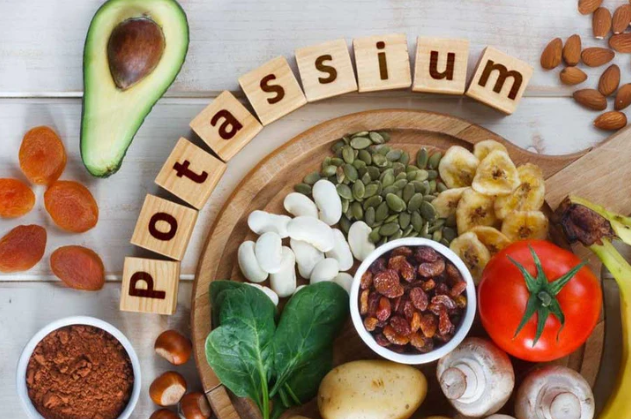
Do you feel a lack of Potassium? With these 12 Main Foods that are High in Potassium, the following can help increase your Potassium.
Potassium or potassium is an essential electrolyte and the third most abundant mineral in the body. Potassium is a compound that is related to sodium to perform several important roles every day, most notably in balancing fluid and mineral levels in the body. That's why having low potassium levels can be so dangerous.
Read: Essentials Nutrients You Need More Of After 50
Potassium is found in all cells of the body and its levels are controlled by the kidneys. It is required for a variety of cellular functions, including regulating the rhythm of heartbeats and nerve impulses, allowing muscles to contract, preventing muscle soreness, supporting digestive health, and increasing energy levels.
What Are the Risks of Low Potassium?
According to records, today many adults do not get half of the potassium intake they need! According to a USDA survey, the average intake of potassium by adults in the US is about 2.8 to 3.3 grams per day for men and 2.2 to 2.4 grams per day for women, but the recommended daily amount is 4. 7 grams per day.
Fortunately, many foods are high in potassium, including nearly all high-quality unpasteurized meat, fish, and dairy products that provide high amounts of potassium, as do many vegetables, legumes, and fruits.
People who are most likely to be deficient in potassium levels are:
- Anyone who often takes laxatives
- Anyone who has recently suffered from an illness that causes vomiting and diarrhea
- Those with certain adrenal glands or kidney disorders
- Alcoholic
- People with uncontrolled diabetes
- Athletes who exercise extra full 1-2 hours a day
- Anyone on a very low-calorie diet
Sufficiently low potassium levels are very common in the general population and usually result in symptoms, including:
- increased blood pressure
- greater risk for heart disease, especially among stroke survivors
- increased salt/sodium sensitivity
- higher risk of kidney stones
- tiredness and difficulty getting good sleep
- poor concentration and memory
- higher risk for diabetes and insulin resistance
- reduced bone formation due to higher levels of calcium being excreted in the urine
- muscle weakness and spasms
- joint pain
Very low potassium levels can cause a severe potassium deficiency characterized by a condition called hypokalemia. Symptoms of hypokalemia include cardiac arrhythmias, glucose intolerance, and muscle weakness.
Hypokalemia is usually caused by factors other than not eating enough potassium-rich foods, such as complications from kidney function, taking diuretics, or being very sick and losing fluids.
One of the biggest problems with having a low potassium intake is that the body is not able to neutralize the acid either. Non-carbonic acid is a by-product of the digestion and metabolism of plant and animal proteins, including grains, milk, and meat.
Potassium in the body is responsible for balancing these acids to keep the body at the right pH because low potassium can mean the body is becoming too acidic.
Recommended Daily Potassium Intake
In 2019, a committee of experts with the National Academies of Science, Engineering, and Medicine established updated recommendations for potassium consumption, which can vary by age and gender.
Read: Here are 5 Side Effects of Too Many Vitamins
Here are the most recent recommendations for potassium:
- 0–6 months: 400 milligrams/day
- 7–12 months: 860 milligrams/day
- 1-3 years: 2,000 milligrams/day
- 4–8 years: 2,300 milligrams/day
- 9–13 years: 2,500 milligrams/day for men and 2,300 milligrams/day for women
- 14–18 years: 3,000 milligrams/day for men and 2,300 milligrams/day for women
- Over 19 years: 3,400 milligrams/day for men and 2,600 milligrams/day for women
- Women who are pregnant or breastfeeding: 2,800–2,900 milligrams/day
- Some people may need more potassium than these figures, such as athletes who exercise more than an hour most days of the week.
Because it has more muscle mass and the body also depends on blood circulation that can carry nutrients to bones, vital organs, and damaged muscle tissue, the body needs foods rich in potassium in greater quantities.
12 of the best sources of potassium

(Percentages are based on the recommended daily value of 4,700 milligrams for adult men and women.)
- White Beans ( 4 ) — 1 cup cooked: 1,004 milligrams
- Lima beans ( 5 ) — 1 cup cooked: 955 milligrams
- Avocado ( 6 ) — 1 whole: 690 milligrams
- Broccoli ( 7 ) — 1 cup cooked: 458 milligrams
- Sweet Potatoes (8) — 1 medium: 438 milligrams
- Bananas ( 9 ) — 1 medium: 422 milligrams
- Salmon (10) — 3 ounces: 416 milligrams
- Peas ( 11 ) — 1 cup cooked: 384 milligram
- Sardines ( 12 ) — 1 can/3.75 gram: 365 milligrams
- Grapefruit ( 13 ) — 1 whole: 354 milligrams
- Raw Milk ( 14 ) — 1 cup: 260 milligrams
- Grass-Fed Beef ( 15 ) — 3 ounces: 237 milligrams
That's the article 12 Main Foods High in Potassium. May be useful.










